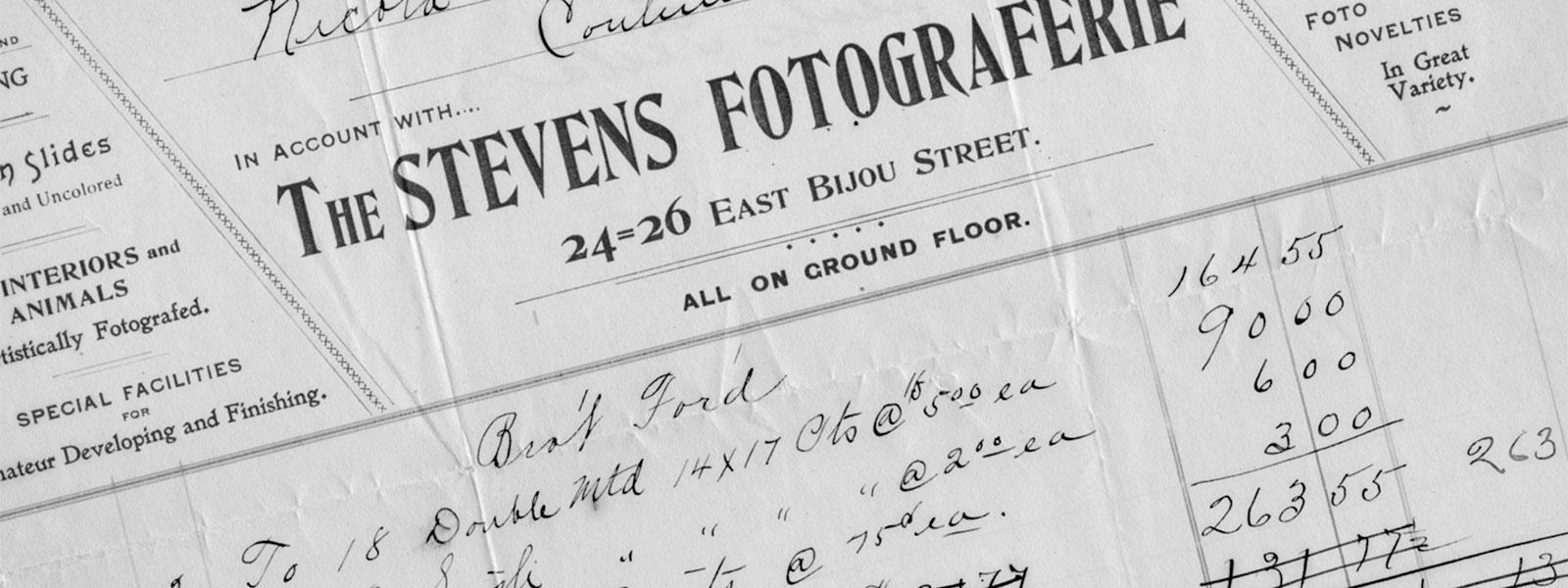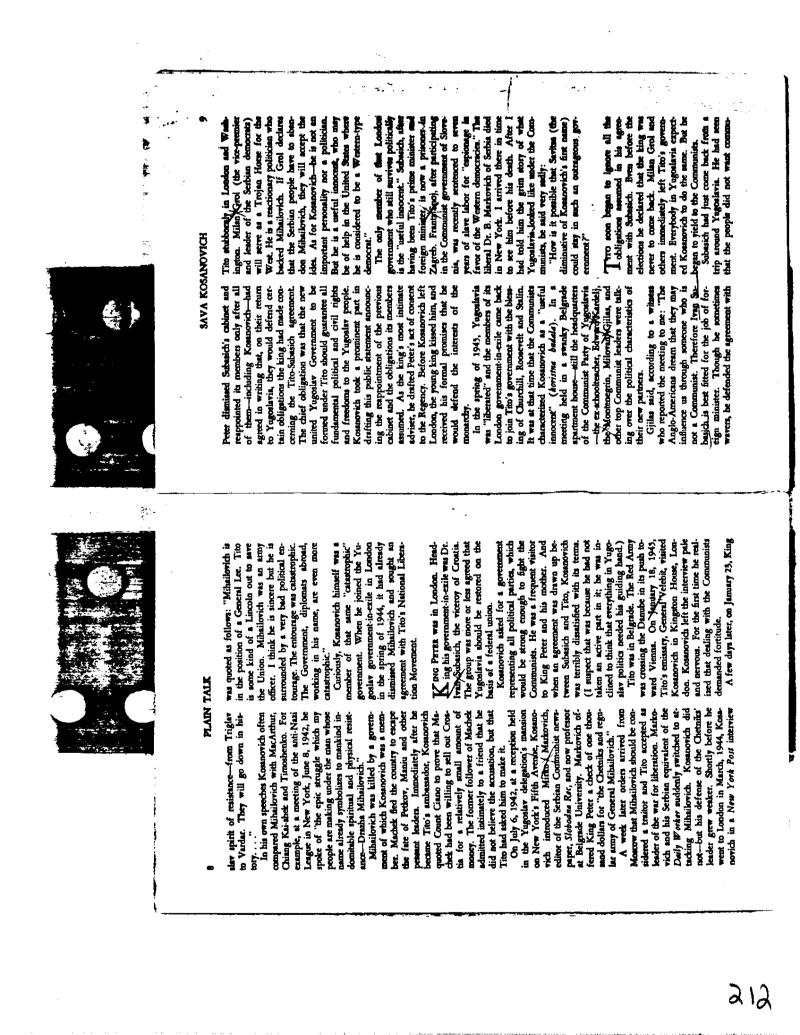
Nikola Tesla Documents
Nikola Tesla FBI Files - Page 212
212 8 PLAIN TALK slav spirit of resistance from Triglav to Vardar. They will go down in his tory. . . ." In his own speeches Kosanovich often compared Mihailovich with MacArthur, Chiang Kai-shek and Timoshenko. For example, at a meeting of the anti-Nazi League in New York, June 8, 1942, he spoke of "the epic struggle which my people are making under the man whose name already symbolizes to mankind indomitable spiritual and physical resistance-Drazha Mihailovich." Mihailovich was killed by a government of which Kosanovich was a member. Machek fled the country to escape the fate of Petkov, Maniu and other pensant leaders. Immediately after be became Tito's ambassador, Kosanovich quoted Count Ciano to prove that Machek had been willing to sell out Crostia for a relatively small amount of money. The former follower of Machek admitted intimately to a friend that he did not believe the accusation, but that Tito had asked him to make it. On July 6, 1942, at a reception held in the Yugoslav delegation's mansion on New York's Fifth Avende, Kosanovich introduced Mirko Markovich, editor of the Serbian Communist news. paper, Slobodna Rec, and now professor at Belgrade University. Markovich of. fered King Peter a check of one thousand dollars for "the Chetniks and regular army of General Mihailovich." A week later orders arrived from Moscow that Mihailovich should be considered a traitor and Tito accepted as leader of the war for liberation. Markovich and his Serbian equivalent of the Daily Worker suddenly switched to attacking Mihailovich. Kosanovich did not-but his defense of the Chetniks' leader grew weaker. Shortly before he went to London in March, 1944, Kosanovich in a New York Post interview was quoted as follows: "Mihailovich is in the position of a General Lee. Tito is some kind of a Lincoln out to save the Union. Mihailovich was an army officer. I think he is sincere but he is surrounded by a very bad political entourage. The entourage was catastrophic. The Government, diplomats abroad, working in his name, are even more catastrophic." Curiously, Kosanovich himself was a member of that same "catastrophic" government. When he joined the Yugoslav government-in-exile in London in the spring of 1944, it had already dismissed Mihailovich and sought an agreement with Tito's National Liberstion Movement. was London. HeadKing his government-in-exile was Dr Ivan Subasich, the viceroy of Croatia. The group was more or less agreed that Yugoslavia should be restored on the basis of a federal union. Kosanovich asked for a government representing all political parties, which would be strong enough to fight the Communists. He was a frequent visitor to King Peter and his mother. And when an agreement was drawn up between Subasich and Tito, Kosanovich was terribly dissatisfied with its terma. (I suspect that was because he had not taken an active part in it; he was inclined to think that everything in Yugoslav politics needed his guiding hand.) Tito was in Belgrade. The Red Army was crossing the Danube in its push toward Vienna. On January 18, 1945, Tito's emissary, General Velebit, visited Kosanovich in Kingston House, London. Kosanovich left the interview pale and nervous. For the first time he realized that dealing with the Communists demanded fortitude. A few days later, on January 23, King SAVA KOSANOVICH Peter dismissed Subasich's cabinet and reappointed its members only after all of them including Kosanovich-had agreed in writing that, on their return to Yugoslavia, they would defend certain obligations the king had made coacerning the Tito-Subasich agreement. The chief obligation was that the new united Yugoslav Government to be formed under Tito should guarantee all fundamental political and civil rights and freedoms to the Yugoslav people. Kosanovich took a prominent part in drafting this public statement announcing the reappointment of the previous cabinet and the obligations its members assumed. As the king's most intimate adviser, be drafted Peter's act of consent to the Regency. Before Kosanovich left London, the young king kissed him, and received his formal promises that be would defend the interests of the monarchy. In the spring of 1945, Yugoslavia was "liberated" and the members of its London government-in-exile came back to join Tito's government with the bless ing of Churchill, Roosevelt and Stalin. It wu that time that the Communists characterized Kosanovich as a "useful innocent" (koristna badala). In a meeting held in a swanky Belgrade apartment house still the headquarters of the Communist Party of Yugoslavia the ex-schoolteacher, Edward Kardelj, the Montenegrin, Milovan Gjilas, and other top Communist leaders were talking over the political characteristics of their new partners. Tito stubbornly, in London and Waalsington. Milan Grol (the vice-premier and leader of the Serbian democrats) will serve as a Trojan Horse for the West. He is a reactionary politician who backed Mihailovich. If Grol declares that the Serbian people have to abandon Mihailovich, they will accept the ides. As for Kosanovich-he is not an important personality nor a politician. But he is a useful innocent, who may be of help in the United States where he is considered to be a Western-type democrat." The only member of that Londoni government who still survives politically is the "useful innocent." Subesich, after having been Tito's prime minister and foreign minister is now a prisoner-in Zagreb. Frant Spoj, after participating in the Communist government of Slove nis, was recently sentenced to seven years of slave labor for "espionage in favor of the Western democracies." The liberal Dr. B. Markovich of Serbia died in New York. I arrived there in time to see him before his death. After I had told him the grim story of what Yugoslavia Jooked like under the Communists, be said very sadly: "How is it possible that Savitsa (the diminutive of Kosanovich's first name) could stay in such an outrageous, government?" Thro soon began to ignore all the obligations assumed in his agreement with Subasich. Even before the elections be declared that the king was never to come back. Milan Grol and others immediately left Tito's government. Everybody in Yugoslavia expected Kosanovich to do the same. But be Gjilas said, according to a witness who reported the meeting to me: "The Anglo-Americans dream that they may influence us through someone who is not a Communist. Therefore Ivag Subegan to yield to the Communists. basich is best fitted for the job of foreign minister. Though he sometimes wavers, he defended the agreement with Subasich had just come back froth a trip around Yugoslavis. He had seen that the people did not want commu
